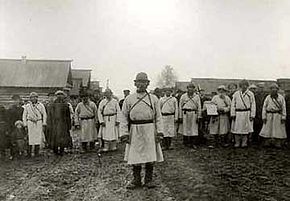- Mari people
-
Mari 
Total population 604,000 Regions with significant populations  Russia
Russia604,000 Languages Religion Predominantly † Orthodox Christianity
(Russian Orthodox Church)
also Marla faithRelated ethnic groups other Uralic peoples
The Mari (Russian: черемисы (old name), марийцы (modern name)), are a Volga-Finnic people who have traditionally lived along the Volga and Kama rivers in Russia. The majority of Maris today live in the Mari El Republic, with significant populations in the Tatarstan and Bashkortostan republics. In the past, the Mari have also been known as the Cheremis in Russian and the Çirmeş in Tatar.
The Mari people consists of three different groups: the Meadow Mari, who live along the left bank of the Volga, the Mountain Mari, who live along the right bank of the Volga, and Eastern Mari, who live in the Bashkortostan republic. In the 2002 Russian census, 604,298 people identified themselves as "Mari," with 18,515 of those specifying that they were Mountain Mari and 56,119 as Eastern Mari. Almost 60% of Mari lived in rural areas.[1]
Contents
Language
Main article: Mari languageThe Mari have their own language, also called Mari, which is a member of the Uralic language family. It is written with a modified version of the Cyrillic alphabet. Linguists today distinguish four different dialects, which are not all mutually intelligible: Hill Mari (мары йӹлмӹ), concentrated mainly along the right Volga bank; Meadow Mari (марий йылме), spoken in the lowland regions of the Kokshaga and Volga rivers, which includes the city of Yoshkar-Ola; Eastern Mari, spoken east of the Vyatka River; and North-Western Mari.
In the 2002 census, 451,033 people stated that they spoke the Mari language.
Religion
Maris have traditionally practiced a pagan faith that closely connected the individual with nature. According to their beliefs, nature exerts a magical influence over people. They relate to it as a sacred, powerful, and living being outside of which man can not exist. Nature serves as a source of absolute good who always helps man as long as he does not harm or oppose it.[2]
The Mari faith also possesses a pantheon of gods who reside in the heavens, the most important of whom is known as the Great White God (Ош Кугу Юмо, Osh Kugu Yumo). Other lesser gods include the god of fire (Тул Юмо, Tul Yumo) and the god of wind (Мардеж Юмо, Mardezh Yumo). The Mari also believe in a number of half-men, half-gods (керемет, keremet) who live on earth. The most revered of these gods is Chumbulat (Чумбулат) Kubrat or Chumbylat (Чумбылат), a renowned leader and warrior.[3]
Christianity was adopted by the Mari in the 16th century after their territory was incorporated into the Russian Empire during the reign of Ivan IV "the Terrible". Adoption of Christianity was not universal, however, and many Mari today still practice paganism or are of the Marla faith, a form of Christianity that retains significant amounts of pre-Christian elements.
Soviet Union
Following the organisation of Muslims in the Soviet Union through Muskom, the Mari Section was set up under the auspices of Narkomnats, the Peoples Commissariat for nationalities. Its task was to facilitate the close union of the Mari people with other people, to abolish anti-Russian mistrust and to raise the "class consciousness" of Mari workers. In practice this involved facilitating grain requisitions by the Soviet state, the recruitment of soldiers for the Red Army and the implementation of Bolshevik control of the society.[4]
See also
References
- ^ Всероссийская перепись населения 2002 года, http://www.perepis2002.ru/index.html?id=87
- ^ Шкалина, Галина. "Язычество народа Мари-феномен европейской культуры". "Етносфера".
- ^ Чумбылат – марийский национальный герой (Russian)
- ^ The Sorcerer as Apprentice: Stalin as Commissar of nationalities, 1917–1924, by Stephen Blank, Greenwood Press, London 1994 ISBN 978-0-313-28683-4
External links
- The Moscow Times: 'Europe's Last Pagans' Worship in Marii-El Grove
- Encyclopaedia of Mari mythology (Russian)
Finno-Ugric peoples Samoyedic peoples Eastern and Oriental Orthodox Christian Ethnic Groups Majority EuropeanArmenians · Aromanians · Belarusians · Bulgarians · Georgians · Greeks (including Greek Cypriots) · Macedonians · Megleno-Romanians · Moldovans · Montenegrins · Ossetians · Romanians · Russians · Serbs · UkrainiansAfro-AsiaticAltaicUralicChukotko-KamchatkanMinority Categories:- Mari people
- Ethnic groups in Russia
- Indigenous peoples of Europe
- Volga Finns
- Mari El
Wikimedia Foundation. 2010.
